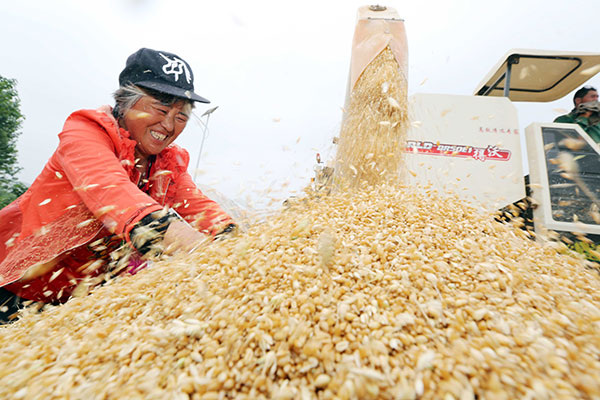
A farmer works with wheat harvested in Huaibei, Anhui province, in May.[Li Xin / China Daily]
A yearlong program to increase yields of wheat, corn and soybeans in China’s less-fertile regions will rely on science and technology to invigorate agricultural production and benefit 70 million farmers, according to an official from the Chinese Academy of Sciences.
The program, dubbed Second Granary, is expected to reap an additional 9 billion kilograms of grain by increasing the output of medium- and low-yielding farmland, said Duan Ziyuan, deputy director of the academy’s Bureau of Science & Technology for Development, at a seminar in Hefei, Anhui province, on Dec 15.
Southern areas of northern and eastern China’s Huanghuaihai Plain, which now produces about 35 percent of the country’s grain, are the target of the program.
A research fund of 36 million yuan ($5.6 million) from the academy and Anhui province was set aside for the project, which is expected to involve around 4.7 million hectares of farmland in Shandong, Henan, Anhui and Jiangsu provinces, Duan said.
China’s farmland is divided into three yield types: high, medium and low. The latter two, which account for about two-thirds of the total, represent some 81.4 million hectares in production nationwide, said Wu Lifang of the academy’s Hefei Institutes of Physical Science.
Speaking at the seminar on the Second Granary experiment, Wu said China already has two major programs aimed at elevating the country’s grain yields, one targeting the Northeast regions and one focusing on North China, called the Bohai Granary.
The Second Granary program was initiated by the academy in 2014 and began with a research staff of 85. It has led to higher grain yields, new seeds, environmentally friendly fertilizers and pesticides and intelligent agricultural robots, said Wu, who is deputy director of the academy’s Institute of Technology & Agriculture Engineering.
In northern Anhui province alone, more than 10 million farmers will benefit from the project, Anhui Deputy-Governor Chen Shulong said.
